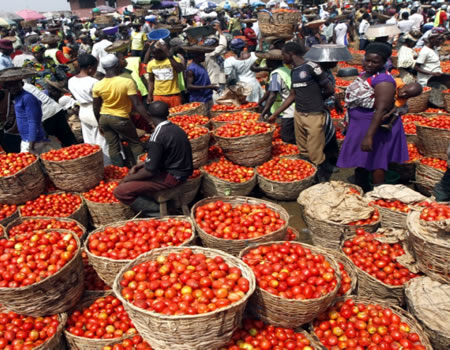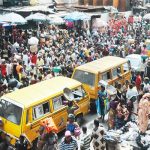Having a sumptuous meal begins with excellent ingredients. When you are looking at getting any food items to prepare food for your party or family, Mile12 market is a place to consider. Its name “Mile 12” was derived from its distance of approximately 12 miles from the heart of Lagos Island. Mile 12 houses different foodstuffs ranging from pepper, tomatoes, yams, onions, plantain, and so much more.
Though the Mile 12 market is famed for its availability of consumables, it does not mean non-consumables are not sold there either.
Wikivoyage briefly describes the Mile 12 market, established in 1977 by the Federal Government of Nigeria during the preparation for the Lagos Black Art Festival to relocate traders from Iddo-Oyingbo Road to Ikorodu Road, primarily to ease the traffic congestion during the festival.
Over the years the market has grown from an open market to a bounty community of traders, farmers, aggregators, and transporters from different parts of the country.
The market is popular among other markets in Lagos and known specifically as the largest market for fresh foods and vegetables in Lagos and the largest Farm-to-market bazaar. Mile12 Market prides itself in affordable varieties of commodities, the Market is estimated to have over 500,000 regular traders daily trading on different commodities, including traders from neighboring countries like Togo, Benin, Ghana, and Cameroon.
Mile12 market is considered to be a melting point for diverse ethnicities and tribes like Yoruba, Hausa, Igbo, Kanuri, TIV, Ibiobio, Calabar, Igbira, Itshekiri, Ijaw, Idoma, Fulani, etc. who engage in various activities and transactions.
Over the years the market has been able to hold its own despite the competition level of business spaces in the state. The market has been relevant for 40 years, by remaining a household name for all food items in Lagos. And is arguably a go-to source of food items in Lagos.
There are thousands of people in Mile 12 every day. The atmosphere is what you expect of a typical Lagos market. Sometimes it can be intense considering that is a connecting point for buyers and sellers alike. It is where all the food products come from within and outside the state’s land.
Mile 12 is one of the popular landmarks in Lagos state, Nigeria. It is part of Lagos that hosts the popular Mile 12 market. The market, located in Ketu, is no doubt one of the biggest marketplaces in the state. It is the choice destination for wholesale and retail shopping, especially for consumables.
video credit: Market Square
What to Expect When Visiting Mile 12 Market
Aside from the business activities happening within and outside Mile 12, it is undoubtedly one of the major places with traffic congestion, This is due to the high population of people and the flock of trucks bringing farm produce to the market from across the country within the area and a couple of bad roads. That said, there are still several things to know about the Mile 12 market.
1. On getting to Mile 12 market, the first thing that is likely to welcome you is the smell of rot. This is largely due to the amount of food that ends up as waste. The market houses almost all kinds of farm products, most of which are fruits – tomatoes, watermelon, oranges, bananas, mangoes, carrots, and many others.
2. Another thing visible before entering the market is the influx in the area. Most of them are traders, including those who hawk goods like sachet water and soft drinks. All these are the likely scenes as you get to the Mile 12 market.
3. Going deep into the market, you will find more buyers and sellers. Also, you will be seeing a considerable number of pickup buses, tricycles, and motorcycles in the market. As you must have already learned, the Mile 12 market is more like a depot point for food items coming to Lagos.
4. Since Mile 12 is a wholesale retail market, it is not unexpected that there are enough goods to see on display. It is also important to note that the prices of goods here are relatively cheap. because most resellers come to the market as a source to stock their shops you are likely going to buy in bulk and not in units.
5. Though you can visit the market at any time of the day, you may also want to consider the season. Is it a rainy or dry season? the market is usually messy during the rainy season, to take a proper tour of the market during the rainy season it is advisable to consider wearing a rain boot or covered shoes to avoid being infected by bacteria.
Operational Details in Mile 12 Market
Mile 12 Market operates all days of the week, including weekends and public holidays. However, like many markets, certain days are more bustling than others.
1. Peak Days: The market experiences peak activity on weekdays, especially from Monday to Friday. These days see a higher influx of traders, wholesalers, and shoppers, creating a lively and bustling atmosphere.
2. Weekend Vibes: While weekends are still busy, the pace in the market is slightly more relaxed compared to weekdays. Saturdays are particularly popular for household shopping, while Sundays witness a mix of business and leisure activities.
3. Festive Seasons: During festive seasons and holidays, such as Christmas, New Year, and religious celebrations, Mile 12 Market buzzes with heightened activity. It’s a time for increased trading, promotions, and festive cheer.
Safety Tips for Shopping at Mile 12 Market
In as much as the Mile 12 market promises a unique shopping experience, this sprawling market can be chaotic, with narrow aisles and crowded shops, so keep the following tips in mind you must take some safety measures by Lagos State Police Command when visiting the famous market.
1. Have a Guide familiar with the Market: From far and near, the market boasts tens of thousands of traders daily. Traders who have come to trade and buy food items of numerous kinds, having no guide to assist you in shopping could make you fall victim to scammers. Please,
2. Don’t display valuables: Leave expensive phones, watches, jewelry, and bags at home or in your locked vehicle. Pickpockets target distracted shoppers, so don’t make yourself an easy mark.
3. Beware of your surroundings: Be alert in crowded areas like shop entrances or checkout lines. Keep bags closed and secure, and watch for people trying to reach into your pockets or bag. Stay near main walkways, avoiding isolated sections of the market.
4. Trust your instincts: If anything feels off or makes you uncomfortable, leave the area immediately. Don’t hesitate to ask security guards or police officers for help if you feel threatened or sense danger. Your safety is the top priority, so get out of any situation that worries you.
How to Get To Mile 12 Market From Various Parts of Lagos
Here are detailed directions on how to get to Mile 12 Market from various parts of Lagos. Note that depending on individual familiarity with lagos means of transportation and route may differs.
From Ikeja (Central Lagos)
- Take a bus heading towards Ojota from the Ikeja Bus Terminal.
- Alight at Ojota Bus Stop.
- From Ojota, take a straight bus going to Mike 12
- Inform the conductor or driver that you’re going to Mile 12 Market
Victoria Island
- Take a bus heading towards CMS or Obalende from Victoria Island.
- At CMS or Obalende, transfer to a bus heading towards Ketu or Mile 12.
- Inform the conductor or driver that you’re going to Mile 12 Market
From Surulere
- From Surulere board a direct bus heading to Ketu or Mile 12
- Inform the conductor or driver that you’re going to Mile 12 Market
From Ajah
- Take a bus heading towards CMS or Obalende from Ajah.
- At CMS or Obalende, transfer to a bus heading towards Ketu or Mile 12.
- Inform the conductor or driver that you’re going to Mile 12 Market
From Oshodi
- From Oshodi board a direct bus going to Mile 12
- Inform the conductor or driver that you’re going to Mile 12 Market
Conclusion
In Summary, the Mile 12 market is like any other major market in Lagos. The usual hustle and bustle is expected, with people bumping into themselves. It is also not without the usual Lagos dramas. On a general note, the market is considered safe. However, this is not enough reason to be careless with your belongings, especially money, because most business transactions are done in cash.
Thanks for reading!






